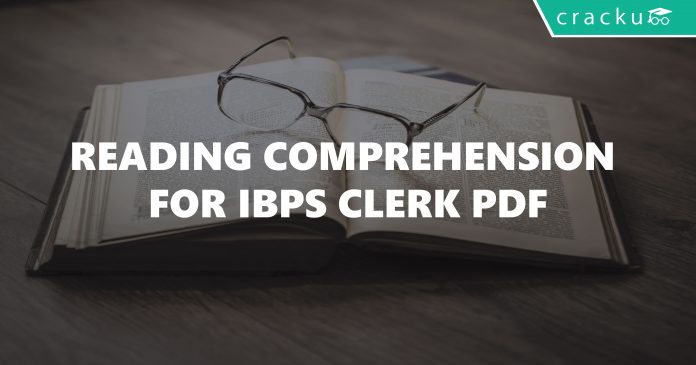Reading comprehension is the most important topic for IBPS clerk english section. Around 8-10 questions are asked on RC in all Bank clerk and PO exams.
Reading Comprehension for IBPS Clerk PDF:
Download RC Questions IBPS PDF
75 IBPS Clerk Mocks – just Rs.199
IBPS Clerk Free Mock Test-2018
Download all IBPS clerk questions and answers PDF.
Instructions:
Read the following passage to answer the given questions based on it. Some words/ phrases are printed in ‘’bold’’ to help you locate them while answering some of the questions.
The e-waste (Management of Handling) Rules, 2011 notified by the Ministry of Environment and Forests, have the potential to turn a growing problem into a developmental opportunity. With almost half-a-year to go before the rules take effect, there is enough time to create necessary infrastructure for collection, dismantling, and recycling of electronic waste. The focus must be on sincere and efficient implementation.Only decisive action can reduce the pollution and health costs associated with India’s hazardous waste recycling industry. If India can achieve a transformation, it will be creating a whole new employment sector that provides good wages and working conditions for tens of thousands. The legacy response of the States to even the basic law on urban waste , the Municipal Solid Wastes (Management and Handling) Rules, has been one of the indifference many cities continue to simply burn the garbage or dump it in lakes. With the emphasis now on segregation of waste at source and recovery of materials, it should be feasible to implement ‘’both sets of rules’’ efficiently. A welcome feature of the new e-waste rule is emphasis on extended producer responsibility. In, other words, producers must take responsibility for the disposal of end-of-life products. For this provision to work, they must ensure that consumers who sell scrap get some form of financial incentive.
The e-waste rules, which derive from those pertaining to hazardous waste, are scheduled to come into force on May 1, 2012. Sounds as they are, the task of scientifically disposing a few hundred, thousand tonnes of trash electronics annually depends heavily on a system of oversight by State Pollution Control Boards (PCBs). Unfortunately, most PCBs remain unaccountable and often lack the resources for active enforcement. It must be pointed out that, although agencies handling e-waste must obtain environmental ‘’clearances’’ and be authorised and registered by the PCBs even under the Hazardous Wastes (Management, Handling and Transboundary Movements) Rules, 2008, there has been little practical impact. Over 95 per cent of electronic waste is collected and recycled by the informal sector. The way forward is for the PCBs to be made accountable for enforcement of the e-waste rules, and the levy of penalties under environmental laws. Clearly, the first order priority is to create a system that will absorb the 80000-strong workforce in the informal sector into the proposed scheme for scientific recycling. Facilities must be created to upgrade the skills of these workers through training and their occupational health must be ensured.
Recycling of e-waste is one of the biggest challenges today. In such a time, when globalization and information technology are growing at a pace which could only be imagined few years back, e-waste and its hazards have become more prominent over a period of time and should be given immediate attention.
100 Free GK tests for Banking (Download App)
Question 1:
What according to the passage is important now for e-waste management?
a) Making rules
b) Reviewing rules
c) Implementing rules
d) Notifying rules
e) Amending rules
Question 2:
Which of the following can be one of the by-products of effective e-waste management?
a) India can guide other countries in doing so
b) It will promote international understanding
c) It will promote national integration
d) It will create a new employment sector
e) It will further employment judiciary
Question 3:
Which of the following rules has not been indicated in the passage
a) e-waste Rules 2011
b) Pollution Check Rules
c) Hazardous Wastes Rules, 2008
d) Municipal Solid Wastes Rules
e) All above have been indicated
Question 4:
‘’Both sets of rules’’ is being referred to which of the following?
a) Solid Waste and Hazardous wastes
b) e-waste and Hazardous waste
c) Solid waste and e-waste
d) e-waste and e-pollution
e) Solid waste and recycling waste
Question 5:
e-waste rules have been derived from those pertaining to
a) Hazardous waste
b) PC waste
c) Computer waste
d) Municipal waste
e) National waste
IBPS CLERK FREE COMPUTER AWARENESS TESTS
Question 6:
Which of the following will help implement ‘’both sets of rules’’?
a) Employment opportunities
b) International collaboration
c) Financial incentive
d) Segregation of waste at source
e) Health costs
Question 7:
e-waste Rules came/come into force from
a) 2008
b) 2009
c) 2010
d) 2011
e) 2012
Question 8:
Which of the following best explains the meaning of the phrase – ‘’which could only be imagined few years back’’, as used in the passage?
a) It was doomed
b) It took us few years
c) It took us back by few years
d) Imagination is better than IT
e) None of these
Blood Relation Questions for IBPS Clerk
Question 9:
Which of the following is true in the context of the passage?
a) No city dumps its waste in lakes
b) Some cities burn garbage
c) PCBs have adequate resources for active enforcement
d) e-waste was a much bigger challenge in the past
e) None of the above
Question 10:
Which of the following is not true in the context of the passage?
a) Some form of financial incentive is recommended for the producers
b) Some financial incentive is recommended for the consumers
c) e-waste will be a few hundred thousand tonnes
d) The agencies handling e-waste have to obtain environmental clearances
e) Those involved in e-waste management would need to upgrade their skills
Reading comprehension questions and answers for IBPS clerk:
Solutions (1 to 10)
1) Answer (c)
The author says that the growing problem of e-waste can be tackled if the rules are efficiently implemented. He also further adds on to say that we can turn the seemingly problematic situation into developmental opportunity by proper implementation.
Hence, the correct option is C.
2) Answer (d)
“Only decisive action can reduce the pollution and health costs associated with India’s hazardous waste recycling industry. If India can achieve a transformation, it will be creating a whole new employment sector that provides good wages and working conditions for tens of thousands”.
According to the above lines in the passage, as per the author, effective e-waste management can result in the creation of new employment opportunities as there is a lot of e-waste generated and its efficient disposal would require manforce. Option D is correct.
3) Answer (b)
Option A is mentioned in the following line as “The e-waste (Management of Handling) Rules, 2011 notified by the Ministry of Environment and Forests, have the ‘’potential to turn’’ a growing problem into a developmental opportunity.”
Option C is mentioned in the following line as “It must be pointed out that, although agencies handling e-waste must obtain environmental ‘’clearances’’ and be authorised and registered by the PCBs even under the Hazardous Wastes (Management, Handling and Transboundary Movements) Rules, 2008, there has been little practical impact.”
And Option D is mentioned in the following line as “The legacy response of the States to even the basic law on urban waste , the Municipal Solid Wastes (Management and Handling) Rules, has been one of the ‘’indifference’’ many cities continue to simply burn the garbage or dump it in lakes”
Only Option B is not particularly mentioned in the passage, hence, answer will be B
Download all GK ebooks for Banking exams
4) Answer (c)
“The legacy response of the States to even the basic law on urban waste, the Municipal Solid Wastes (Management and Handling) Rules, has been one of the ‘’indifference’’ many cities continue to simply burn the garbage or dump it in lakes. With the emphasis now on segregation of waste at source and recovery of materials, it should be ‘’feasible’’ to implement ‘’both sets of rules’’ efficiently”
According to the lines above from the passage, we can conclude that by “both sets of rules” author means Solid wastes and e-waste.
Option C is correct.
5) Answer (a)
“The e-waste rules, which derive from those pertaining to hazardous waste, are scheduled to come into force on May 1, 2012.”
According to the above lines of the paragraph, we can conclude that e-waste rules have been derived from Hazardous waste.
Hence, answer will be A
6) Answer (d)
“With the emphasis now on segregation of waste at source and recovery of materials, it should be ‘’feasible’’ to implement ‘’both sets of rules’’ efficiently.”
According to the above lines from the passage, we can infer that segregation of waste at source helps to implement “both sets of rules” efficiently. Hence, answer will be D
7) Answer (e)
“The e-waste rules, which derive from those pertaining to hazardous waste, are scheduled to come into force on May 1, 2012”
Hence, e-waste rules came into force from may 1, 2012. Answer will be E
8) Answer (e)
“Recycling of e-waste is one of the biggest challenges today. In such a time, when globalization and information technology are growing at a pace ‘’which could only be imagined few years back”
According to the above lines from the passage, “which could only be imagined few years back’ means that the advancement in IT sector were only in conceptional stages and their implementation has been very fast in very short time. And none of the options are describing the same explanation hence, answer will be E
9) Answer (b)
“the Municipal Solid Wastes (Management and Handling) Rules, has been one of the ‘’indifference’’ many cities continue to simply burn the garbage or dump it in lakes.”
According to the lines above from the passage, we can infer that some cities burn garbage. No other option can be inferred from the passage. Hence, answer will be B
10) Answer (a)
“In, other words, producers must take responsibility for the disposal of end-of-life products. For this provision to work, they must ensure that consumers who sell scrap get some form of financial incentive.”
According to the above lines of the passage, we can say that financial incentive is recommended for the consumers and not for the producers. Hence, option A couldn’t be concluded and answer will be A





![How To Manage Time In CAT Exam? [Section-wise Tips] How to manage time in CAT exam ?](https://cracku.in/blog/wp-content/uploads/2018/09/fig-03-09-2018_10-54-46-218x150.jpg)